Posted May 20, 2018 by Nicky in Reviews / 0 Comments
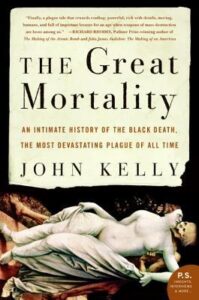 The Great Mortality, John Kelly
The Great Mortality, John Kelly
The Great Mortality is how the Black Death was referred to, before we came to know it by that evocative name. There’s a lot of detail here if you’re interested in the historical aspects of the plague: where it struck, how people reacted, the changes it brought about. The scientific background is a bit more lacking, though: there’s some tantalising hints, like a brief discussion of the increased virulence of the illness compared to the modern version that’s still endemic in some parts of the world, but for me with my primarily scientific rather than purely historical or sociological outlook, it began to drag.
So, not a bad read, but not what I was really looking for.
Rating: 3/5
Tags: book reviews, books, history, non-fiction, science
Posted March 27, 2018 by Nicky in Reviews / 0 Comments
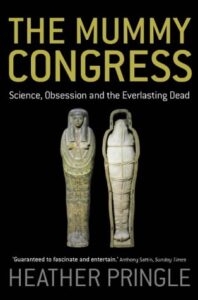 The Mummy Congress, Heather Pringle
The Mummy Congress, Heather Pringle
Mummies are always fascinating to me, at least in non-fiction, and this book was especially so because it covers a lot of ground, from Inca child sacrifices to Stalin to ancient bog bodies. It’s the kind of book I love, with something new (but related) in each chapter, introducing new sites and concepts I wasn’t aware of without going into any one thing exhaustively. I found myself googling for images to match the text.
The only thing I would really criticise is the hyperbolic breathlessness about how some of these mummies “look as if they were alive” or “wouldn’t look out of place on the street”. No, the preservation is amazing, but I have yet to see a mummy that is truly so immaculately preserved that it wouldn’t stick out like a sore thumb trying to walk around the streets. The faces are sunken, the jaws and teeth and cheekbones too prominent, etc, etc. They’re obviously dead. I find I have more respect for them while recognising that they’re dead than trying to pretend that they look just as they did when alive. They don’t.
There’s an amazing amount to be learned from some of these bodies, and Pringle does a great job of showing some of the breadth of what’s out there and what questions we need to ask.
Rating: 4/5
Tags: book reviews, books, history, non-fiction
Posted March 25, 2018 by Nicky in Reviews / 0 Comments
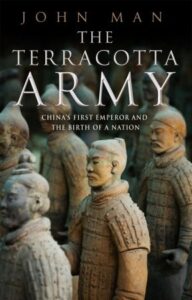 The Terracotta Army, John Man
The Terracotta Army, John Man
The Terracotta Army is great popular history: atmospheric, easy to read, almost a travel guide to seeing the Army in the modern world as well as to understanding its context and how it came to be. Man writes engagingly about the politics that informed the creation of the Terracotta Army and how it was seen, and about the politics which informed the revelation of the Army and the way it is now viewed in the world. He makes a lot of smart points, and though I don’t know the history of the period or the area well enough to judge whether he’s right in his analyses, it seemed convincing to me.
I’m definitely thinking of picking up more of Man’s work; this wasn’t unputdownable, but it was definitely easy to just keep reading instead of finishing a chapter, putting it down, and going to sleep. He brings the events and politics to life very clearly. It doesn’t feel greatly in depth, but it’s entertaining and informative.
Rating: 3/5
Tags: book reviews, books, history, non-fiction
Posted March 15, 2018 by Nicky in Reviews / 2 Comments
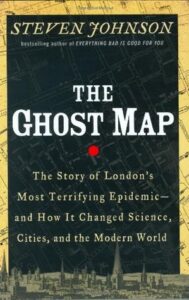 The Ghost Map, Steven Johnson
The Ghost Map, Steven Johnson
This is a really good account of the outbreak of cholera that led to John Snow’s famous map, showing that a particular water pump was the culprit. He traces the history of how London dealt with sewage and how it became such a big issue, and also examines some of the main characters in the drama of trying to stop the outbreak — and trying to challenge miasma theory, which was so much the paradigm at the time. There isn’t a lot of specific science stuff here, but Johnson makes clear why the cholera pathogen is so deadly in a very accessible way.
The only weird part is in the conclusion/afterword to the book, where Johnson talks more generally about the risks to city life and starts discussing nuclear war and terrorism. It seems very much a non-sequitur, and adds nothing to the book to my mind.
Rating: 4/5
Tags: book reviews, books, history, non-fiction, science
Posted February 22, 2018 by Nicky in Reviews / 6 Comments
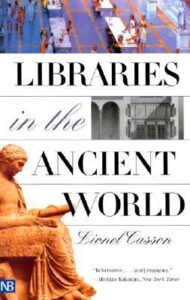 Libraries in the Ancient World, Lionel Casson
Libraries in the Ancient World, Lionel Casson
Libraries in the Ancient World contains a not too surprising round of historical libraries, including of course the Palace of Ashurbanipal and the Library of Alexandria, but nonetheless I found it interesting to read about exactly who libraries were for and how they worked in various societies. Casson’s style is engaging, and I found it just overall the kind of relaxing read about a thing I love that fills an excellent gap without being wildly exciting or revelatory.
I know that seems like faint praise, but I really can’t think of anything else to say! If you want to look at the history of libraries, this makes a good start.
Rating: 3/5
Tags: book reviews, books, history, non-fiction
Posted February 11, 2018 by Nicky in Reviews / 8 Comments
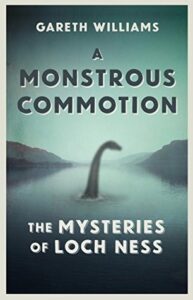 A Monstrous Commotion, Gareth Williams
A Monstrous Commotion, Gareth Williams
After reading his book on polio and his book on smallpox, I wasn’t quite sure what to make of Gareth Williams turning his hand to something like the Loch Ness Monster — but nonetheless, I knew he was a good writer and understands science and the importance of evidence. And Nessie is fascinating, of course; even if there is no Nessie (and I tend to think there isn’t) then it’s fascinating how people have believed there was a Nessie, and spent their whole lives searching for her. I needn’t have worried, anyway: Gareth Williams presents the evidence without much sign of being partial. He notes when people’s evidence was convincing or their testimony likely to be trustworthy, as well as noting when people carried out fakes.
It turns out to be exactly as fascinating as you’d expect, looking at all sorts of people who made or broke their reputations hunting for the monster. In the end, we have very little direct evidence pointing to the existence of a Nessie, so unsurprisingly the book looks at the human side of the drama, along with the sciences that, over time, people have brought to bear on the problem.
I’m sure some writers wouldn’t be able to make this interesting, but to me, Williams did. And if nothing else, he had me wanting to believe in Nessie, for all that he attempted to stay neutral himself (and I wouldn’t like to pin him down on either side of the debate for absolute certain, though I think a lot of people wish it could be true but don’t think it is).
Rating: 5/5
Tags: book reviews, books, history, non-fiction, science
Posted January 21, 2018 by Nicky in Reviews / 0 Comments
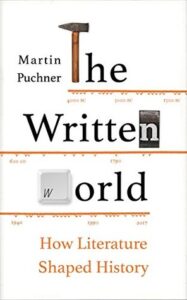 The Written World, Martin Puchner
The Written World, Martin Puchner
I’ve seen some complaints about the historical accuracy of this, particularly in regard to the earliest sections, but I’m unable to judge because it’s not really my area of history at all — inasfar as I know my history anyway, which is often patchy. I simply enjoyed The Written World as a summary, from one perspective, of how some stories and books have changed the world in being written (or in the case of previously oral works, written down). Puchner writes compellingly about books I haven’t read yet, and really makes them sound tempting — The Tale of Genji, for example (though he also makes Don Quixote sound fascinating, and I did not love that at all).
It’s not the be-all and end-all, but if you love books and you want to read about some books that have been important in shaping society, then this should be right up your street (up your bookshelf?).
Rating: 4/5
Tags: book reviews, books, history, non-fiction
Posted January 16, 2018 by Nicky in Reviews / 0 Comments
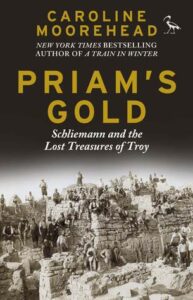 Priam’s Gold, Caroline Moorehead
Priam’s Gold, Caroline Moorehead
This book is actually more of a biography of Heinrich Schliemann than a discussion of the excavations at Troy; although it does follow “Priam’s Treasure” and what has happened to it since Schliemann excavated it, including commentary on the politics that surrounded its loss and (eventual) subsequent retrieval, the main focus is Schliemann, his life, and his work as an archaeologist. There’s a lot of it taken up with Schliemann’s life before he found Troy, and a fair amount of time spent on evaluating the truth of his account of the excavation and indeed other aspects of his life.
There is some discussion of Troy and specifically the treasure found there, and there are some insights to other excavations led by Schliemann, but if you’re looking for an archaeology book, this isn’t quite it. There’s a lot more time spent on what languages Schliemann could speak and his relationships with his wives than on actual archaeology. It’s interesting, but not entirely what I hoped for.
Rating: 3/5
Tags: book reviews, books, history, non-fiction
Posted January 8, 2018 by Nicky in Reviews / 0 Comments
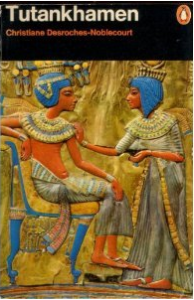 Tutankhamen, Christiane Desroches-Noblecourt
Tutankhamen, Christiane Desroches-Noblecourt
I read this when I was a kid — I think I got my copy from my mother, who was about as fascinated by Tutankhamen as I was. Christiane Desroches-Noblecourt’s book is a serious, albeit now somewhat outdated, analysis of the objects found in Tutankhamen’s tomb and their significance, along with how Howard Carter found the site and the context of Tutankhamen’s reign. It can be pretty dry and serious, describing some of the artefacts in detail; I was surprised to realise that I read it with as much attention as a child as I did now as an adult. Clearly, Tutankhamen’s treasure cast a spell on me!
If you’re looking for the very latest information, of course this isn’t going to help. But if you’re looking for a solid introduction to the tomb and the early interpretations of the objects found within, I suspect this is one of the best. More so where the objects are concerned than where the mummy itself is concerned, though.
Despite the fact that some of it is dry, it’s worth remembering that this book kept me spellbound as a nine or ten year old, and again as a twenty-eight year old. It’s fascinating stuff.
Rating: 4/5
Tags: book reviews, books, history, non-fiction
Posted December 8, 2017 by Nicky in Reviews / 3 Comments
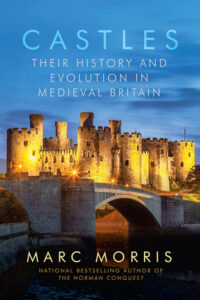 Castles: Their History and Evolution in Medieval Britain, Marc Morris
Castles: Their History and Evolution in Medieval Britain, Marc Morris
If you’re fascinated by castles, then I definitely recommend this book. It’s not just a dry recounting of what castle was built when, but an examination of why castles were built and what they were used for, and what they say about the people who built them. There are some gorgeous photos and ideas for places to visit, but it’s not intended as an exhaustive guide — it focuses on a couple of example castles, rather than talking about every single significant or interesting castle in Britain.
Even better, Morris keeps the tone light, knowing just when to comment wryly or appreciatively about the people and ideas he’s writing about. It’s not just an interesting read in terms of the information given, but an entertaining one too.
Rating: 5/5
Tags: book reviews, books, history, non-fiction
 The Great Mortality, John Kelly
The Great Mortality, John Kelly








